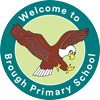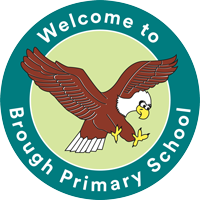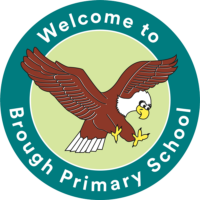Intent
Our musical curriculum at Brough Primary School develops learning by giving children the ability to gain knowledge and improve their own wellbeing. We promote a love of music and singing across a broadened curriculum. We have a unique music scheme, part Oak Academy-based and part written by the Music Lead, which incorporates the National Curriculum requirements and gives an integrated, practical, exploratory and child-led fun approach to musical learning.
The lessons are based around: 1. Listening and Appraising 2. Singing; Playing instruments; Composition 3. Performing.
Brough Primary School children gain a good understanding of what music is through listening, singing, playing, evaluating, composing and performing, across a range of historical periods, styles, traditions, and musical genres.
Performing Arts are given real purpose with year-group performances, dance clubs, participation in regional and national competitions and concerts as well as our KS2 children being given the yearly opportunity to perform at Flybe Arena, Sheffield, as part of the nationally-acclaimed Young Voices choir. Our Performing Arts collaboration of both choirs and dance groups are given an excellent platform in which to perform at our yearly Summer Soiree, which opens up the school to families to enjoy both their children performing and a chance to appreciate the school community. Our school also has a successful Recorder Club for LKS2 pupils.
We are committed to ensuring children understand the value and importance of music to their own and others’ lives through performance, as well as how music can improve wellbeing. All children have access to music regardless of their ability, race, ethnicity, background or language. SEND pupils are actively encouraged to participate as music is often an area of the curriculum which allows them to be fully included and excel, removing barriers to their learning; use of symbols and graphics, a greater emphasis on aural memory skills, encouragement to use voices expressively, physical contact with instruments and rest breaks are all examples of how SEND pupils can access the music learning in our school, bringing in equality considerations from the start of their school life, but allowing them to meet the same objectives.
Aims
The national curriculum for music and performing arts aims to ensure that all pupils:
- perform, listen to, review and evaluate music across a range of historical periods, genres, styles and traditions, including the works of the great composers and musicians
- learn to sing and to use their voices, to create and compose music on their own and with others, have the opportunity to learn a musical instrument, use technology appropriately and have the opportunity to progress to the next level of musical excellence
- understand and explore how music is created, produced and communicated, including through the inter-related dimensions: pitch, duration, dynamics, tempo, timbre, texture, structure and appropriate musical notation
- all pupils should be enabled to participate in and gain knowledge, skills and understanding associated with the artistic practice of drama
- pupils should be able to adopt, create and sustain a range of roles, responding appropriately to others in role
- they should have opportunities to improvise, devise and script drama for one another and a range of audiences, as well as to rehearse, refine, share and respond thoughtfully to drama and theatre performances
- role-play and other drama techniques can help pupils to identify with and explore characters. In these ways, they extend their understanding of what they read and have opportunities to try out the language they have listened to
- drama and role-play can contribute to the quality of pupils’ writing by providing opportunities for pupils to develop and order their ideas through playing roles and improvising scenes in various settings
- reading, re-reading, and rehearsing poems and plays for presentation and performance give pupils opportunities to discuss language, including vocabulary, extending their interest in the meaning and origin of words.
Implementation
The music curriculum at Brough Primary School ensures children sing, listen, play, perform and evaluate. Through their music lessons and Performing Arts activities, teachers are able to deliver inclusive lessons for all children to access the musical and arts curriculum in a fun and engaging way, further promoting a love of learning.
The elements of music are taught in classroom lessons so that children are able to use some of the language of music to dissect it, and understand how it is made, played, appreciated and analysed. They also learn how to compose, focusing on different dimensions of music, which in turn feeds their understanding when listening, playing, or analysing music.
Children have the opportunity to not only learn music in the classroom, but also perform, from participating in year-group plays and musical performances, being part of the Recorder Club to singing in the choir. This can be as part of arena concerts with Young Voices or singing in the community. At Brough Primary School, we pride ourselves on giving the children opportunities to learn to love and appreciate all genres of music, to use their physicality to perform and grow in self-belief, learning life lessons in being team players, sharing and having compassion and understanding for others.
Each year during our Summer Soiree, children have the opportunity to experience performing to a wider audience. This showcases the amazing talent that many of our children have in Brough Primary School with dances ranging from contemporary performances to street dance, and from Maypole dancing to ballroom dancing. The school also gives pupils the opportunity to participate in performing arts outside the school through dance and drama, competing successfully in regional and national competitions.
Impact
Music and the performing arts are creative areas that allow children to develop their confidence and their ability to make relationships with their peers. Through music and the performing arts, children learn resilience, determination and experience personal growth so that when they leave us at the end of Year 6 they are able to appreciate and talk about a wide range of musical genres, as well as compose simple melodies and rhythms.
To this end, as a school we are confident in the knowledge that we give children not only musical theoretical knowledge, but also a widening of their understanding of music and performing, having given them opportunities to showcase their learning beyond the National Curriculum during performances in and out of school. Children are then well-equipped to further develop their creative abilities and self-expression in secondary school and later life.
Music will also develop an understanding of culture and history, both in relation to students individually, but also in terms of ethnicity across the world.
EYFS and KS1 use floor books and pictorial and video evidence to forge their own musical journey, which in turn allows them to revisit areas that need to be improved upon as well as areas of strength and show progress.
KS2 use manuscript books as well as pictorial and video evidence, allowing for clear areas of learning to be written and also recorded.
- Children will learn and use the key vocabulary that a musician would use.
- Children will achieve age related expectations in music at the end of their cohort year.
- Children will retain knowledge that is pertinent to music.
- Children will participate in wider musical activities.
- Children will have heightened awareness of musical opportunities available in and outside of school.
Children benefit from an enormously rich palette of musical genres here at Brough Primary School, which allows them to develop their own tastes and preferences as listener, composer or performer. Music gives our children a sense of achievement, self-confidence, interaction with, and awareness of others, and self-reflection.


